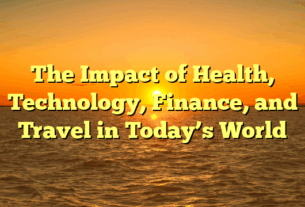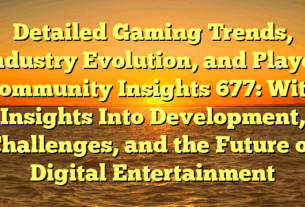—
In today’s rapidly evolving world, the fusion of health is transforming how we interact. Innovations in one area are no longer standalone, but instead, they drive growth in the others.
Modern Finance and Technological Disruption
Finance has undergone remarkable change due to technology. Conventional financial systems is being challenged by FinTech startups. Investors can now invest using their mobile apps, often without ever entering a physical financial institution.
Digital currencies like Bitcoin have transformed the concept of money itself. Automated digital agreements, enabled by blockchain, allow for trustless transactions, eliminating the need for intermediaries.
Moreover, artificial intelligence (AI) is now used in fraud detection, delivering faster and more accurate results. Financial firms rely on AI-driven insights to optimize investment strategies.
gerhanatoto of Technology in Health and Intelligence
It’s no longer just about gadgets; it’s becoming a key player in personal wellness and intelligence augmentation. Wearable devices like smartwatches track blood pressure, giving users real-time feedback about their health.
Telemedicine platforms are increasingly popular, allowing patients to speak with doctors remotely. This is particularly important in rural areas where access to healthcare is limited.
AI is also being used to diagnose diseases, analyze medical scans, and tailor treatments. Chatbots assist patients in scheduling appointments, monitoring symptoms, and providing answers.
When it comes to cognitive ability, technology has boosted our ability to learn and grow. AI-driven platforms personalize education based on individual learning styles. Meanwhile, brain-computer interfaces (BCIs) are exploring how to connect human thoughts with machines, unlocking new levels of potential.
The Intelligence Factor
Cognition plays a crucial role in all these sectors. As machines become smarter, humans must also sharpen their cognitive skills. Emotional intelligence (EQ) is becoming essential in a world dominated by automation.
In addition, decision-making in finance, health, and tech is increasingly data-driven. However, it still requires human intuition. Critical thinking, creativity, and ethical reasoning remain uniquely human traits.
Educational programs and platforms are being redesigned to develop higher-order thinking. From early childhood to executive leadership, there is a push for lifelong learning in both IQ and EQ.
A Unified Ecosystem
What makes this era truly unique is the way these domains are interconnected. For example, a healthcare app may use AI to assess your health data, blockchain to secure your medical records, and financial tools to track your insurance claims.
Similarly, a financial platform may leverage health data to offer customized insurance packages, while using intelligent algorithms to reduce fraud.
Policymakers and executives are starting to recognize the importance of an integrated approach. Investing in one sector often has benefits across the others. Funding AI research might lead to new educational tools.
The Challenges Ahead
Despite these promising developments, there are barriers to consider. Data privacy is a growing concern. As our data becomes increasingly digital, it’s vital to ensure security and transparency.
Ethical questions also arise: Who is accountable when an AI makes a bad decision? How do we ensure that technology doesn’t exacerbate existing social gaps? These issues require thoughtful regulation and collaborative governance.
Access is another concern. Not everyone has equal access to these tools. A digital divide may mean some populations are left behind in the race for innovation. Ensuring inclusion will be key to creating a truly universal tech-driven future.
Conclusion
To conclude, the synergy between finance, technology, intelligence, and health is driving a revolution of progress. The future holds the promise of smarter systems, healthier lives, and more efficient economies — but only if we address the challenges with wisdom.
Those who adapt will lead, while those who ignore them may be left behind. It’s time to shape a world where finance work hand in hand for the benefit of all.



